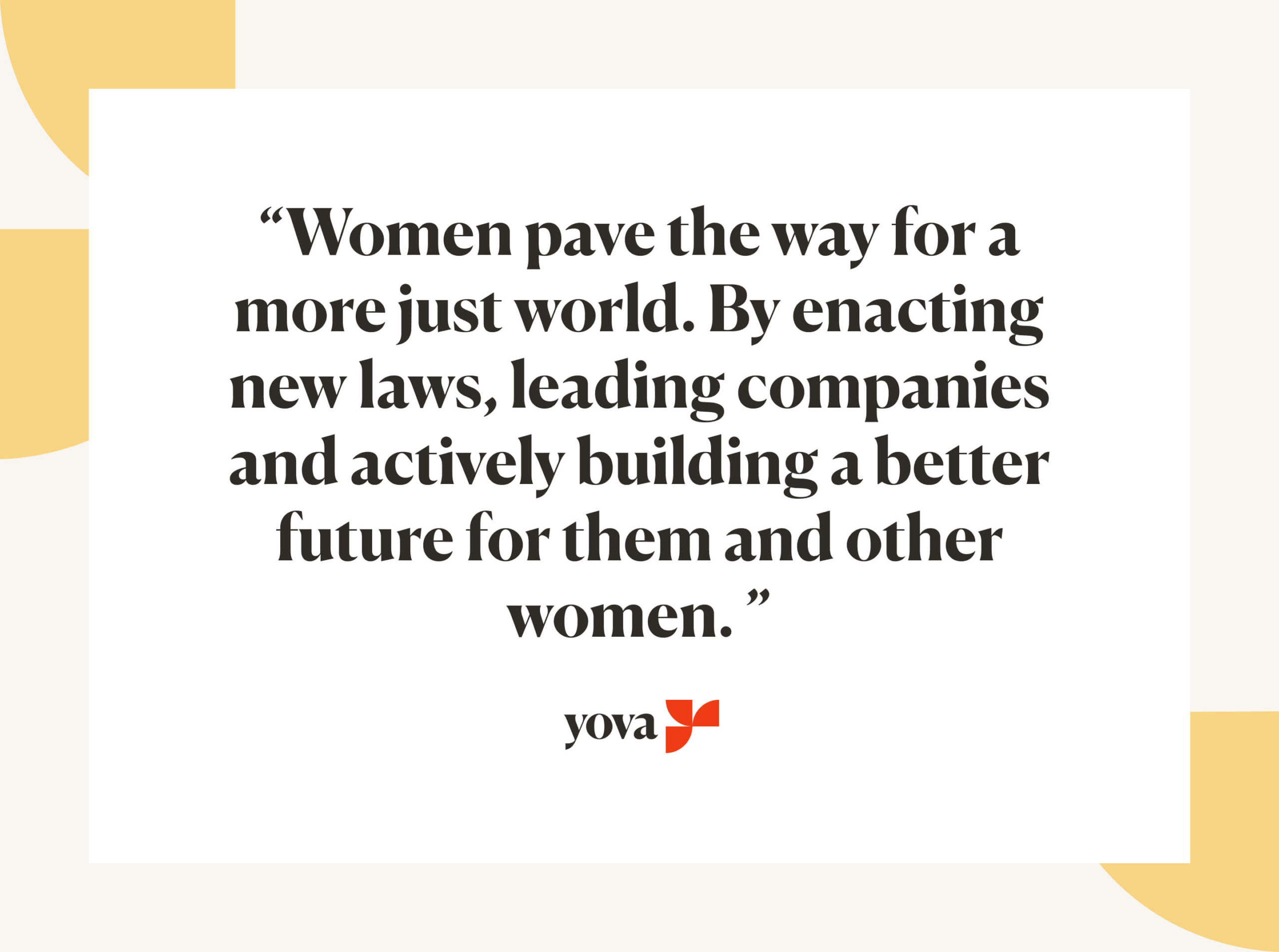Currently, there are only a handful of women occupying top positions in companies. But is it really enough? In this article, you’ll discover why we advocate for more female leadership roles in this world.
Did you know that from a young age little girls develop less self-esteem than boys? This often relates to gendered differences in parental influence: “Girls are not allowed to get dirty or to take risks. They are raised to fit in. Boys on the other hand are nurtured to grow up tough, rather than caring. This affects the self-image: boys have higher self-esteem compared to girls with the same exact performance at school”, explains educational scientist Margrit Stamm from the research facility Swiss Education. “That’s why women are statistically more likely to have self-doubt and lack the confidence to exceed their career expectations later in life.”
Before they are old enough to even choose a profession, women are conditioned to dream small. It’s not surprising that a lot of women struggle with breaking the glass ceiling. It’s exhausting to fight your way through a world consisting of one obstacle after another along the career path.
While the struggle is true for all genders, women biologically draw the shorter straw in the career game. Pregnancies often require women to eventually take sick or maternity leave, forcing women to put their careers on hold or exit the workforce altogether. An additional challenge for women in senior-level positions is that they are twice as likely as women overall to be the only ones in the room at work. That makes them more likely than women who work with other women to feel pressure to work more and to experience microaggressions, including needing to provide additional evidence of their competence, according to a report about Women in the Workplace by McKinsey & Partner.
Our society deserves more diversity
While it was completely normal for women to work just as hard and as much as men in medieval times, things took a turn when worker guilds were established. Those guilds did not accept women – a rule that is still in full effect today in Zurich’s worker guilds. This exclusion of women from respected professions changed Switzerland’s view on the standard family model: the father goes to work, the mother runs the household and the kids fall into the typical gender roles of girls and boys. A black and white world with no space for diversity.
And that’s why we now live in a society that relies almost entirely on women when it comes to jobs in the health and care industry, with women filling 91% of jobs in this sector. These physically and mentally challenging jobs are almost exclusively done by women. Especially during a pandemic, we should all acknowledge that this imbalance of genders in the care sector is prone to blowing up in our faces sooner or later.
A large portion of the following data is taken from the exhibition “Gender”, an exciting installation at Stapferhaus in Lenzburg. It’s open to the public until 31 October 2021 – a visit is recommended!
A visible imbalance in all areas:
- Only 16 percent of all workers earning more than CHF 16,000 each month are female.
- Historically speaking, there have been more members of the federal council named Hans (14) than women overall (9). Currently, the female level of representation in the state and federal councils is only at 39 percent.
- 94 percent of the global country leaders are male. However: the countries led by women have delivered a much better performance in the challenging year of 2020 than those led by men.
- At Swiss universities, only 23 percent of professors are female.
- Out of all bricklayers in Switzerland, 1 percent are female and 99 percent are male.
The imbalance is also strongly embedded in our daily lives:
- Only 24 percent of all people named in daily newspapers are female.
- According to a study looking at the proportion of women in bands from Basel, only 15 percent of the musicians are female.
- On a similar note, the keys on a piano are designed for male hands. This raises the risk for work-related pain and injuries in women.
- The same goes for crash test dummies or airbags, which are also designed using male body specifications. This leaves women particularly at risk in the case of a car accident.
- Of the money paid out by occupational pension funds, women only receive 31% as opposed to the 69% received by men.
- While men are more likely to suffer from cardio-vascular diseases, it’s statistically more likely for women to die from these diseases, as standard testing is designed for male physiology.
- By and large, medication – including medicine designed to battle cervical cancer – is often not tested on or for women.
These are only some examples of the deep-rooted fixation on the male gender. This is precisely why we need more women in leadership roles: to create an equal base for all. We need women as professors and women as presidents. They serve as role models for little girls who’d love to help and get stuff done. They are the ones who inspire other women to break the glass ceiling too. And they pave the way for a more just world. By enacting new laws, leading companies and actively building a better future for them and other women.
Adena Friedman, CEO of Nasdaq, seems to share this opinion. In recently announced rules, the Nasdaq now imposes a new rule that requires companies to prove that women or other minorities are represented on the board in order to be traded at its stock exchange. If this rule can’t be met, the company has to make a public statement and give an explanation. This measure is supposed to offer more transparency and a higher quota for women, LGBTQ+, and minorities in leadership positions.
The crux of the quota
Sure, the word “quota” always sounds a little “mandatory” and people don’t like to be forced. But it’s 2021, who’s got the time to wait around until everybody is on the same page? Norway is taking this to heart by demanding a 40 percent quota in board members of local companies.
In the meantime, Paris needs to pay a fine over EUR 90,000 because too many women are working in leadership positions. According to the french ministry, 40 percent of C-level employees need to be of one gender. With currently 31 percent men occupying leadership roles in the offices of french officials, that quota has not been met. However, the (female) mayor is “happy” to pay the fine and will do so together with other women in leadership roles. “We have to accelerate the pace to one day reach the parity, by electing more women than men”, says mayor Anne Hidalgo.
Wait a minute. More women than men? Correct – to really even out the playing field for future generations, we have to work out the mistakes we made in the past. And women can benefit this task greatly: with their empathy, their caring nature, their knowledge, their resilience, and diversity. Women can help cultivate work environments free from toxic work ethics, develop more efficient workflows and find creative solutions to benefit our everyday lives. And maybe one day, medication for women will be developed by women.
It’s still a long way until equality becomes reality but we are starting to see the light at the end of the tunnel: “2020 has been the year for women – at least on the executive floors of significant Swiss companies like UBS, Mobiliar, or Hotelplan Group”, was a recent headline in SonntagsZeitung. The only downside of this news is that none of the mentioned women in that article belong to a minority.
Every woman in a leadership position is one step closer to a just future and companies need to dare to take this step now. For a better world for all. 2021 shall again be the year for women in top positions – but this time let’s offer the seats to minorities as well.
Want to learn more about gender equality? Read this comment from Inyova-CEO Dr. Tillmann Lang if you’d like to find out more about how equality can open up chances for all. Find out why the gender question is related to the climate crisis in this Op-Ed. And for all men (and women) who feel a little overwhelmed by all this: CEO Tillman Lang has four very easy tips for you on how to achieve equality in your everyday life.




